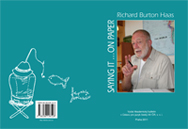
“You have hissed your mystery exam,” said the Reverend William Spooner to an Oxford student. The student bit his lip to keep from smiling, and offered an excuse for missing his history exam. He would soon tell his classmates that Spooner had done it again, and “You have hissed your mystery exam” would be added to the list of spoonerisms including “a scoop of boy trouts,” for a troop of boy scouts; “Let me sew you to your sheet,” for Let me show you to your seat; and “Let us drink to the queer old Dean,” for Let us drink to the dear old Queen.
Dendopedology – that’s what Prince Philip, Duke of Edinburgh, might have called it. It is “the science of opening your mouth and putting your foot in it. I’ve been practicing it for years.” So have I, Prince Philip, and as long as these delightful language gaffes create a little pleasure, let’s not stop them. Let’s celebrate them!And why not? We all make errors. Lewis Thomas, the noted essayist of science, said, “we are built to make mistakes, coded for errors.” Indeed we are. I am. A doctor suggested I take a new medicine along on my canoe trip. He said it was good for bee stings, mosquito bites, poison ivy, and I said, “A pancreas.” He smiled (a nice man), “Yes, a panacea.” I imagine he celebrated that error with friends.
Oh sure, errors can be serious, but they’re also fun. A brochure stated: “the royal city of Most was found in 1238.” I asked how long it had been lost. In Budapest, a river cruise on the Danube announced it had “language speaking hostesses.” I wondered what they spoke when off duty. I asked a waitress in Debrecen for a Coke. She asked, “Light or simple?” I wasn’t sure what a “simple” Coke was, so I ordered “light.” A box of soy meat in Prague wanted to say it was “tasty,” but instead said “tasted.” A guarantee, but hardly hygienic. An elderly lady on a historical farm outside of Kecskemét explained how the oven in her grandmother’s house was heated: “Grandmother used dried reeds and mice.” My wife gasped, “Were the mice dried?” “A little,” the lady said, “but just the insides.” She meant to say “maize.” Her grandmother burned corn cobs, not mice.
The familiar name for some of these errors is a slip of the tongue. If you want to get fancy, lapsus linguae means slips of the tongue, and lapsus calami means slips of the pen (that’s what I read anyway). But there’s also parapraxis, commonly known as a Freudian slip – that’s where an error supposedly reveals a subconscious belief, thought, or emotion. Now we’re getting into dangerous territory. A young woman says, “I want to be your life.” She thought she was going to say, “I want to be your wife.” What did she really mean? What would Dr. Freud say? A waitress offers dessert: Parisian Peach Pie or Pineapple Passion Cake. A young man says, “Personal Passion, please.” A joke or a Freudian slip? It’s safer to just say, “Cake.”
Spoonerisms, slips, parapraxes, whatever you call them are often delightful accidents. But some enjoyable errors are not accidents at all; they are cleverly invented language tricks, but that’s for next month. Right now, I’m running out of sprinting pace – I mean printing space. So, until next month, I’ll just say, “Eyeball.” (Bye all)
RICHARD HAAS,
Oddělení studia jazyků ÚJČ AV ČR, v. v. i.












 English
English
